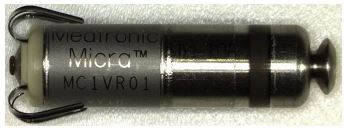FDA BRIEF: WEEK OF APRIL 4, 2016


MICRA Transcatheter Pacemaker System
Medtronic, Minneapolis, Minnesota, USA
INDICATION: Patients with a heart arrhythmia called atrial fibrillation or those who have other dangerous arrhythmias, such as bradycardia-tachycardia syndrome.
UNMET MEET:
- First pacemaker that does not require wired leads to provide an electrical connection between the pulse-generating device and the heart
- Avoids lead malfunction, infections, pocket- and lead-related complications, dislodgements
REG. PATHWAY: PMA
DEVICE DESCRIPTION:
- World’s smallest pacemaker
- One inch-long, self-contained pacemaker implanted directly in right ventricle
- Integrated delivery system : Micra Delivery Catheter, Micra Introducer
EFFECTIVENESS:
- Single clinical trial, n=719
- Pacing capture threshold : 98%, 6 mo. after implantation
SAFETY:
- Complications (<7%): Prolonged hospitalizations, deep vein thrombosis, pulmonary embolism, heart injury, device dislocation, heart attacks
- Contraindications: Patients with implanted devices that would interfere, severely obese, intolerance to device materials, heparin

PNEUMOLINER Tissue Containment System
Advanced Surgical Concepts, Bray, Ireland
INDICATION: Use in women without uterine fibroids undergoing hysterectomy, pre-menopausal women with fibroids- laparoscopic power morcellation appropriate therapeutic option compared to more invasive surgery. PneumoLiner device has not been proven to reduce the spread of potentially cancerous tissue during power morcellation.
UNMET NEED:
- 1 in 350 women undergoing hysterectomy/myomectomy have uterine sarcoma
- Morcellation risks spread of the cancerous tissue; lowers survival
- Need for system to contain morcellated tissue
REG. PATHWAY: De Novo
DEVICE DESCRIPTION:
- Containment bag and a tube-like plunger to deliver the device into the abdominal cavity
- Bag is sealed and inflated – creation of working space around tissue and visualization during morcellation
EFFECTIVENESS:
- Tested in laboratory settings to simulate actual use and worst-case scenario
- Containment bag impermeable to substances similar in molecular size to tissues, cells, body fluids
- Inflated bag provided adequate space to perform morcellation with good visualization
- Stress testing demonstrated device could withstand forces in excess of clinical use
SAFETY:
- Contraindications: Limited patient population
- Risks : Dissemination of morcellated tissue, injury to surrounding tissues or organs, infections, prolongation of surgical procedure
- Required physician training
FDA continues to warn against use of laparoscopic power morcellators for removal of uterus or uterine fibroids in the vast majority of women